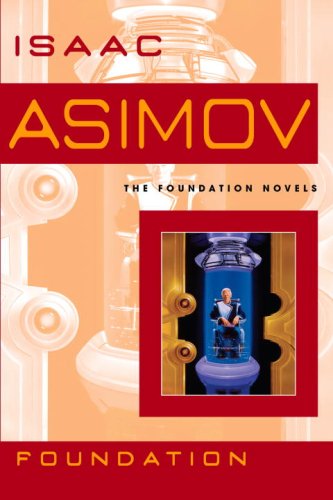All Nonfiction
- Bullying
- Books
- Academic
- Author Interviews
- Celebrity interviews
- College Articles
- College Essays
- Educator of the Year
- Heroes
- Interviews
- Memoir
- Personal Experience
- Sports
- Travel & Culture
All Opinions
- Bullying
- Current Events / Politics
- Discrimination
- Drugs / Alcohol / Smoking
- Entertainment / Celebrities
- Environment
- Love / Relationships
- Movies / Music / TV
- Pop Culture / Trends
- School / College
- Social Issues / Civics
- Spirituality / Religion
- Sports / Hobbies
All Hot Topics
- Bullying
- Community Service
- Environment
- Health
- Letters to the Editor
- Pride & Prejudice
- What Matters
- Back
Summer Guide
- Program Links
- Program Reviews
- Back
College Guide
- College Links
- College Reviews
- College Essays
- College Articles
- Back
Foundation by Isaac Asimov
There's no question among critics and fans of the misunderstood and often underestimated genre of science fiction that Isaac Asimov was a galaxy-shifting writer. He took the genre and squeezed it from the pulp when he penned the classic saga of space sovereignty, Foundation. Although it's set thousands of years in the future, this is no bubble-gum space opera. There are deep political, spiritual and economic implications which Asimov portrays in the struggles for dominance between multiple planets over a period of three-hundred years.
Foundation revolves around different prophecies, stored in a time vault by psychohistorian Hari Seldon, which tell of the Empire's inevitable downfall in five hundred years and the thirty thousand years of dark ages which follow. Terminus, a desolate and resourcefully deprived planet which is dedicated to completing an expansive compilation of human knowledge, The Encylopedia Galactica, receives these prophecies every few decades and often they involve a crisis of some sort. Much of the conflict is drawn from how the prophecies are interpreted and applied by mayors, merchants and religious leaders on Terminus.
This theme of psychohistory, a foretelling of the future based on events of the past, isn't totally from Asimov's imagination. He borrowed "a little bit of cribbin' from Edward Gibbon" when writing the novel, and the influence that the iconic novel of Western Roman history, The Decline and Fall of the Roman Empire, has on Foundation is massive. There are occasions where Foundation seems like a full-fledged allegory of Gibbon's masterpiece, but this shouldn't come as a disappointment since the events in Foundation are still satisfying in regards to the science fiction element of the novel. Rather, it is fascinating to watch the parallels between the events in Foundation and the history of Western Rome. Plus, they're subtle enough that you'll appreciate the small comparisons – for instance, the way Mayor Commdor threatens to kill his wife to keep his power and how Emperor Nero in Rome did the same -- just as much as the more obvious ones.
Asimov lends a hefty amount of Foundation to scenes of pure dialog, which may turn off readers who yearn for some intergalactic dogfights and supersonic tyranny. While both of those are supplied, much of the plot's progression comes from political meetings and merchant bartering sessions. These are interesting to witness, considering Asimov's formidable ability to intrigue the reader, but I wished I saw more scenes where the lives of ordinary people and their reactions to events in the Empire are portrayed, not just the actions of elite political leaders.
Foundation probably won't convert anyone who is dead-set on avoiding science fiction, since it unmistakably caters to the genre, and those who are only remotely interested in SF may find it difficult to suspend their disbelief to the extent that Asimov demands. But it will brighten the nebula within those of us who cherish science fiction, and remind us of why we grew to revere the genre in the first place.
Similar Articles
JOIN THE DISCUSSION
This article has 0 comments.

